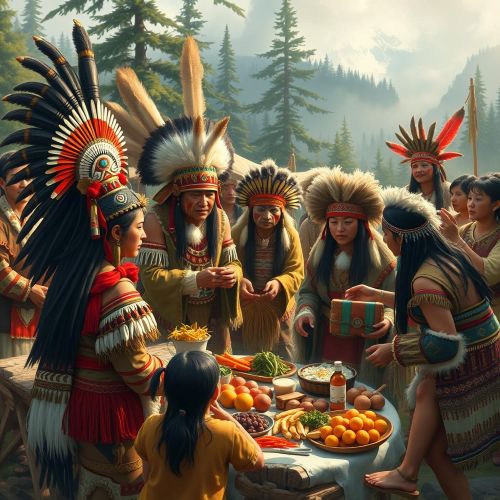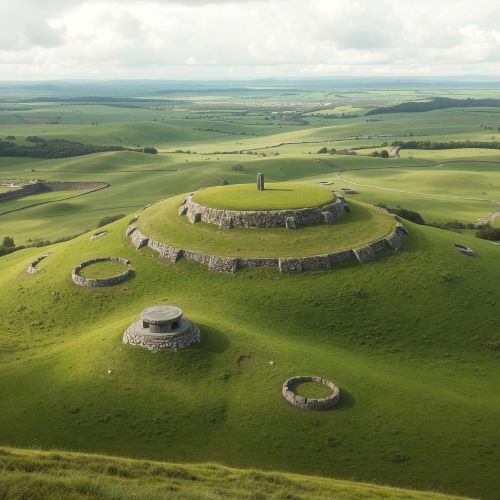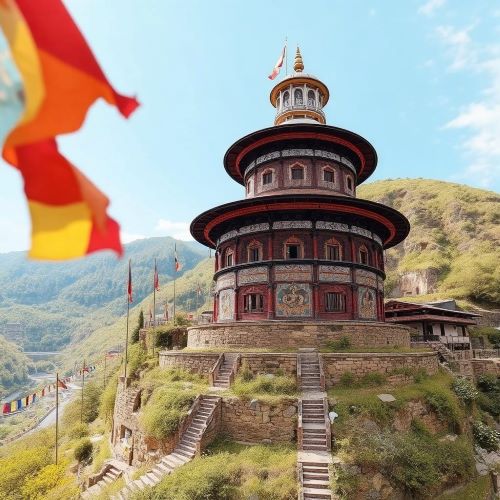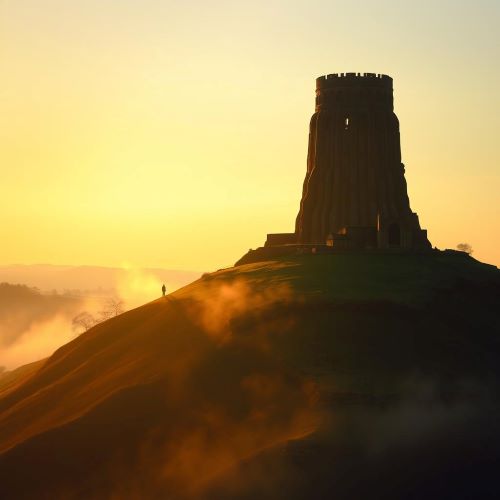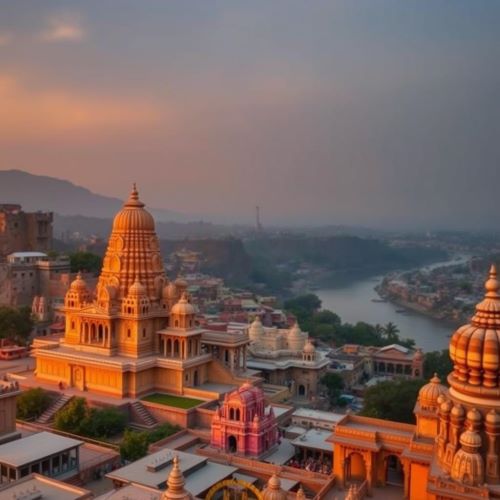Knockma Hill : The Fairy Kingdom
At a glance
| Description | |
|---|---|
| Mythology | Celtic Mythology |
| Country | Ireland |
| Closest airport | Ireland West Airport Knock |
| Type | Natural |
| Accessibility | 09/10 |
Introduction
Tucked away in the rolling countryside of County Galway, Knockma Hill rises like a sentinel of Ireland’s mystical past. Known in Irish as Cnoc Meadha, meaning “Hill of Maeve,” this 170-meter-high landmark is far more than just a scenic spot. It is a place where history, folklore, and nature converge. Over centuries, locals and travelers alike have been drawn to its stories of fairy kings, warrior queens, and ancient burials. Today, Knockma Hill stands as a cherished destination for hikers, myth lovers, and anyone curious about Ireland’s enchanted landscapes.
Connection with Mythology
Mythology runs deep in the stones and soil of Knockma Hill. According to legend, it is the final resting place of Queen Maeve of Connacht, one of the most powerful and enigmatic figures in Irish mythology. Maeve is often depicted as a fierce leader and cunning strategist in tales like the Táin Bó Cúailnge (Cattle Raid of Cooley). One of the large cairns on the summit is traditionally believed to mark her grave.
Yet, the hill’s myths don’t end there. Another tale ties Knockma Hill to Césair, a mythical leader who supposedly arrived in Ireland before the biblical flood. She’s said to be buried here too, lending even more ancient reverence to the place.
The strongest local legend, however, is of Finnbheara (or Finvarra), the fairy king of Connacht. Believed to reside beneath the hill in a glittering palace, Finnbheara is said to govern the realm of the Sidhe—an invisible world parallel to our own. Accounts of fairy lights, mysterious music, and strange dreams have long been associated with Knockma Hill, feeding the idea that this is a thin place, where the boundary between our world and the otherworld fades.
Ways to Get There
Visiting Knockma Hill is relatively easy, especially for those traveling from Galway City. Located about 30 kilometers north, the drive takes just under 40 minutes. You’ll head toward Tuam via the N17, then follow signs for Castlehackett and Caherlistrane. Parking is available near the base of the hill, close to the old Castlehackett Tower House.
Public transport can get you as far as Tuam, but from there, you’ll need to arrange a taxi or rent a car to reach the trailhead. For more adventurous souls, cycling from Tuam to Knockma Hill is another scenic option, passing through classic Irish countryside and stone-walled lanes.
What to Look For
As you begin your walk, you’ll notice how effortlessly Knockma Hill combines natural beauty with a sense of the sacred. A network of trails winds through the forested lower slopes and up to the summit. Each route is well-marked and ranges from easy strolls to moderately challenging hikes. Whether you choose the Avenue Loop, the Forest Loop, or the Queen Maeve Trail, you’re in for a rewarding experience.
On the way up, you’ll pass lush woodlands scattered with fairy doors—colorful little portals that local children and artists have created in tribute to the Sidhe. These playful additions are charming nods to the hill’s reputation as a fairy stronghold.
At the top, the cairns dominate the landscape, standing as solemn reminders of Ireland’s ancient ceremonial past. From this elevated vantage point, panoramic views stretch across the Galway plains and beyond—an ideal spot to pause and soak in the atmosphere.
Also notable is the limestone pavement found along some trails, similar to the Burren’s famous rock formations. Cracked and creviced, these ancient stones have inspired folklore that they serve as hidden entrances to the fairy realm.
Though the Castlehackett House is privately owned and not open to visitors, the ruins of its medieval tower house can still be seen near the car park, offering another touchpoint with the area’s layered history.
Need a place to stay? Book your hotel room now!
Importance in cultural history
Knockma Hill is not just a scenic hiking spot—it is a site of immense cultural value. Archaeological evidence suggests that the area has been significant since at least the late Mesolithic period. The cairns and other features atop the hill indicate it was used for burial and ritual purposes thousands of years ago.
But what truly sets Knockma Hill apart is its living folklore. Throughout the 18th and 19th centuries, stories continued to circulate about fairy battles, strange lights, and missing time. One of the most enduring accounts describes a battle in the sky above the hill, said to have occurred around 1846, between the forces of good and bad fairies. Local witnesses claimed to have seen lights and heard ghostly music—a tale that cemented the hill’s mythical status.
Even today, oral traditions and storytelling events in nearby communities keep the legends alive. Writers, artists, and scholars have also been drawn to Knockma Hill, finding in it both inspiration and a tangible link to Ireland’s mythic identity.
The memory of Colonel Patrick Kelly, a Galway native who led the famed Irish Brigade during the American Civil War, is honored with a memorial here, adding yet another layer of historical depth to the landscape.
Best time to travel
The best times to explore Knockma Hill are during Ireland’s spring and summer seasons, typically from April through September. During these months, the weather is relatively mild, and the landscape bursts with greenery, blooming wildflowers, and active wildlife. This is when the trails are at their most enjoyable, both for walking and photography.
Early mornings and late afternoons offer the softest lighting and a sense of solitude—ideal for those looking to experience the hill’s more mystical side. Autumn also casts a beautiful palette across the forest, with rich reds and golds lining the trails and fewer visitors on the path.
While winter isn’t off-limits, conditions can be damp and chilly, with shorter daylight hours. That said, a winter visit can still be magical if you’re well-prepared and seek a quieter, more introspective experience.
Source
Visit Knockma Hill – Hill of Maeve with Discover Ireland. (2025). https://www.discoverireland.ie/galway/knockma-hill-hill-of-maeve
Knockma Hill | Walking trails, directions, day trips … – Galway Tourism. (2024). https://www.galwaytourism.ie/knockma-hill/
Martin Byrne. (2021). Cesair’s Cairn, Knockma – Carrowkeel. http://www.carrowkeel.com/sites/cong/knockma.html
Visit Knockma Hill – Hill of Maeve with Discover Ireland. (2025). https://all-about-ireland.com/location/knockma_hill___hill_of_maeve
Contributors to Wikimedia projects. (2009). Cnoc Meadha – Wikipedia. https://en.wikipedia.org/wiki/Cnoc_Meadha
Frequently Asked Questions
Lorem ipsum dolor sit amet, consectetur adipiscing?
Lorem ipsum dolor sit amet, consectetur adipiscing elit. Praesent convallis vestibulum justo, ac tincidunt nunc vehicula quis. Nullam id dolor quis orci malesuada feugiat. Curabitur aliquet libero at urna ullamcorper, ac ultricies nulla dapibus.
Lorem ipsum dolor sit amet, consectetur adipiscing?
Lorem ipsum dolor sit amet, consectetur adipiscing elit. Praesent convallis vestibulum justo, ac tincidunt nunc vehicula quis. Nullam id dolor quis orci malesuada feugiat. Curabitur aliquet libero at urna ullamcorper, ac ultricies nulla dapibus.
Lorem ipsum dolor sit amet, consectetur adipiscing?
Lorem ipsum dolor sit amet, consectetur adipiscing elit. Praesent convallis vestibulum justo, ac tincidunt nunc vehicula quis. Nullam id dolor quis orci malesuada feugiat. Curabitur aliquet libero at urna ullamcorper, ac ultricies nulla dapibus.
Lorem ipsum dolor sit amet, consectetur adipiscing?
Lorem ipsum dolor sit amet, consectetur adipiscing elit. Praesent convallis vestibulum justo, ac tincidunt nunc vehicula quis. Nullam id dolor quis orci malesuada feugiat. Curabitur aliquet libero at urna ullamcorper, ac ultricies nulla dapibus.
Lorem ipsum dolor sit amet, consectetur adipiscing?
Lorem ipsum dolor sit amet, consectetur adipiscing elit. Praesent convallis vestibulum justo, ac tincidunt nunc vehicula quis. Nullam id dolor quis orci malesuada feugiat. Curabitur aliquet libero at urna ullamcorper, ac ultricies nulla dapibus.



